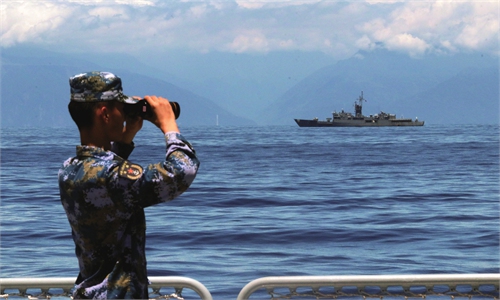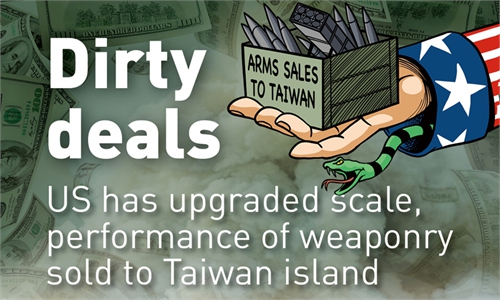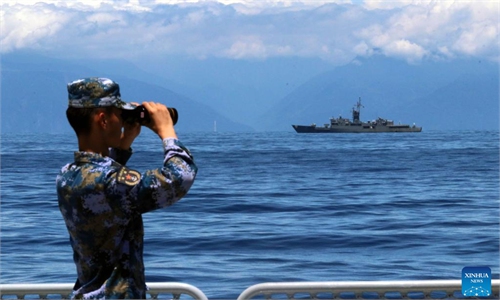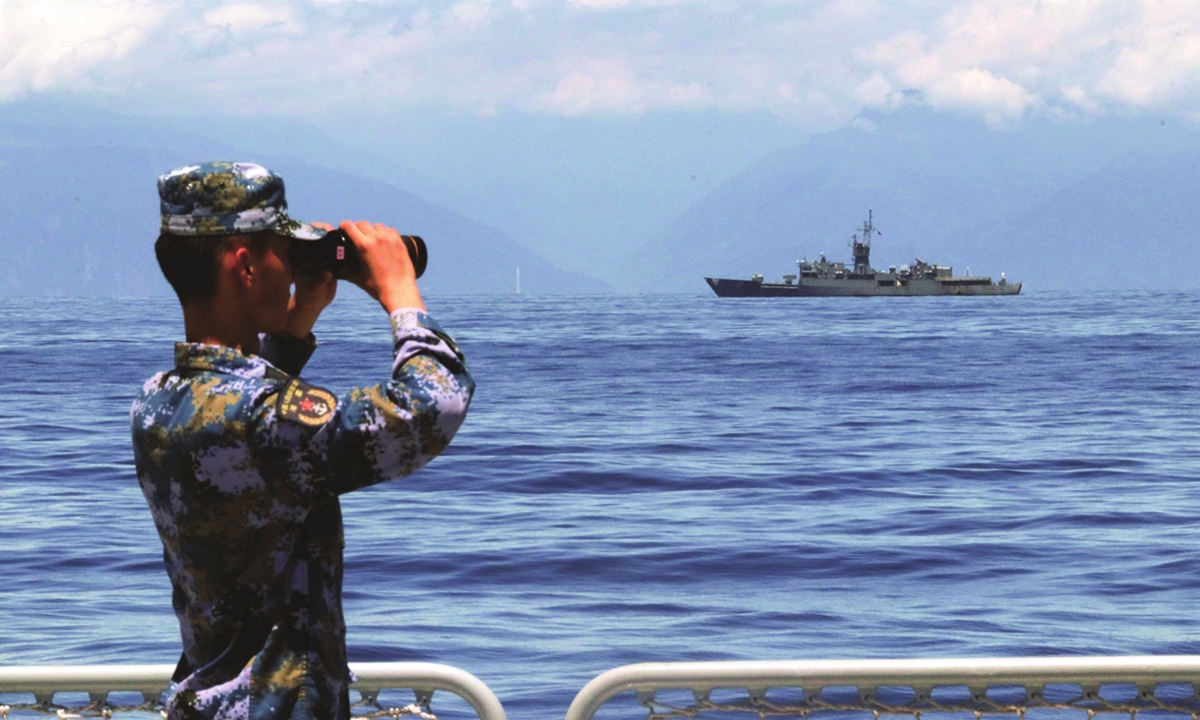
A soldier looks through binoculars during combat exercises and training of the navy of the Eastern Theater Command of the Chinese People's Liberation Army (PLA) in the waters around the Taiwan island, August 5, 2022. Photo: Xinhua
Editor's Note:Tensions in China-US relations and the Taiwan Straits situation caused by US House Speaker Nancy Pelosi's early August visit to Taiwan, China, continue to ferment. The Global Times (GT) interviewed four veteran diplomats and scholars to dig into the historical context surrounding the Taiwan question, give a true account of those historical moments, and analyze the profound impact of the current tension in the Taiwan Straits. These interviews are aimed at showing readers the back and forth between China and the US over the Taiwan question, and helping them better understand what the one-China principle is about. The Global Times plans to publish these interviews in two parts. The following are the interviews with Li Daoyu (Li) and Zhou Wenzhong (Zhou), both former Chinese ambassadors to the US.
The US attempt to 'exploit Taiwan to contain China' is very dangerous
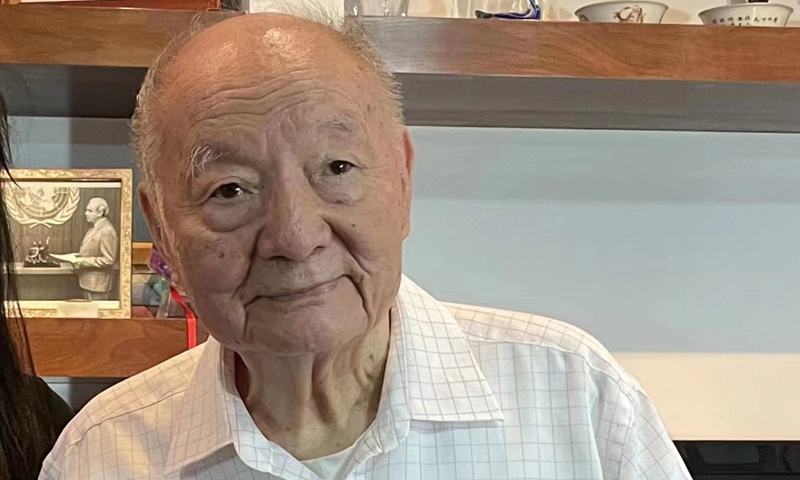
Li Daoyu
Li: There were several factors that contributed to Lee's visit to the US.
First, the international situation had changed greatly. After the collapse of the former Soviet Union and the regime changes in Eastern Europe, Washington believed that China's importance in the relationship among the US, the Soviet Union and China had diminished, and it was questionable how long China's socialism could be maintained, and most Democratic and Republican politicians advocated a tougher stance against China.
Secondly, after the Clinton administration took office, though it reaffirmed the one-China principle in the open, it secretly planned to elevate its relations with Taiwan island, thereby testing China's red line. The Taiwan side believed that judging from both the international situation and the Clinton administration's policy, the time had come for the elevation.
Thirdly, Lee Teng-hui was to run for election in 1996 and needed the overt support from the US. Lee used money to achieve this end, focusing on soliciting support from the Congress and pressuring the government through the Congress.
And fourthly, the Clinton administration lost the mid-term elections in the fall of 1994 and urgently needed to woo right-wing and pro-Taiwan forces for support.
GT: Before and after Lee Teng-hui's visit to the US, how did we resolutely stand up to the US side? What countermeasures were taken?
Li: The tug of war had begun half a year before Lee's visit to theUS. The visit was not an isolated event, but the strongest of a series of interactions between the US and Taiwan in their bid to develop relations. In May 1994, Lee Teng-hui started the so-called "vacation diplomacy" and went to Hawaii for transit. The US side required that he should not leave the airport and did not arrange for anyone to meet him. It was a test.
China fought back against such an attempt. I went to the US government time and again to make representations. On May 19, 1995, a US senator revealed Washington's decision to allow Lee to visit the US. I immediately called the US Department of State and the White House, but nobody answered the phone. Peter Tarnoff, then Under Secretary of State, did not return my call until the afternoon, acknowledging the news and giving a spiel about how it would not change the relations between two countries. On May 22, then president Clinton decided that he would allow Lee to make an unofficial, private visit to the US during the first week of June, participating in the Cornell University's graduation ceremony.
After the official announcement by the US, China voiced its protest and took a series of countermeasures, suspending all high-level visits at the vice-ministerial level and above.
On June 7, 1995, Lee Teng-hui visited the US. Warren Christopher, then US Secretary of State, wrote to Qian Qichen, then Vice Premier and Foreign Minister, to explain, and we refused to respond. We made representations to the US government with regard to Lee Teng-hui's activities in the US that we learned of, such as demanding that no flags be flown at the airport, and that the governor would not meet with him. On June 8, President Clinton made an appointment with me at the White House, and there were special arrangements for reporters to take pictures to set the mood. We both kept our faces taut. He said that today Lee Teng-hui arrived at Cornell, that it was an unofficial, private visit, and that he and other US officials would not meet Lee. He also said that this would not change the relations between the two countries, and that the US still upheld the one-China principle. I pointed out that the US decision violated the three China-US joint communiqués (Shanghai Communiqué,China-US Joint Communiqué on the Establishment of Diplomatic Relations and Communiqué of August 17)and undermined the foundation of the bilateral relations. I told him that the nature of Lee's visit to the US could not be concealed, that it was a mistake of the US government, and that his visit should be terminated immediately. President Clinton said he would send Under Secretary Tarnoff to China to make further explanation. I did not give any response.
China initiated more than a dozen countermeasures against Lee's visit to the US, including recalling the ambassador for debriefing, postponing the Wang-Koo talks, as well as military countermeasures. In July 1995 and March 1996, we conducted missile and military exercises off the coast of Fujian and around the island of Taiwan - these two countermeasures produced the greatest impact. The recall of the ambassador to the US for debriefing was very rare and it was a very big shock to the US side. Later the Chinese side also put the nomination of the US ambassador to China on ice for some time. After this struggle, the Clinton administration realized clearly the importance and sensitivity of the Taiwan question.
It should be said that after Lee's visit to the US, Washington made a pledge to impose restrictions on Taiwan's dignitaries and reiterated its stance that it would not support Taiwan's "independence," or "two Chinas" or "one China, one Taiwan," and would not support Taiwan's membership in any international organization that must be attended by sovereign states. The US also stated that it pursued a policy of engagement, not containment, with China.
GT: What does the Chinese government's handling of Lee Teng-hui's visit to the US in 1995 and the third Taiwan Straits crisis tell us about our response to the Taiwan Straits situation today?
Li: First, the Taiwan question is a matter of China's core interests, and we will not give an inch on it. Our determination and actions to counteract had greatly shaken the US back then, and today our national strength is even stronger, the US attempt to "exploit Taiwan to contain China" is less likely to succeed.
Secondly, it is very dangerous for the US to "exploit Taiwan to contain China." Nancy Pelosi's visit to Taiwan was just like Lee's visit to the US; in both cases, the US was the one who initiated and stirred up trouble and who went back on its words and reneged on its commitments to the one-China principle. The US side must not disregard China-US relations and peace and stability in the Taiwan Straits and go further and further down the wrong and dangerous path.
And thirdly, it is clear where the international community stands: more than 170 countries have voiced their support for China to safeguard national sovereignty and territorial integrity, reaffirmed their firm commitment to the one-China principle, and condemned Nancy Pelosi's provocative actions. This has demonstrated that China's complete reunification is the will of the people and a trend that is unstoppable.
Strategic considerations behind US arms sales to Taiwan
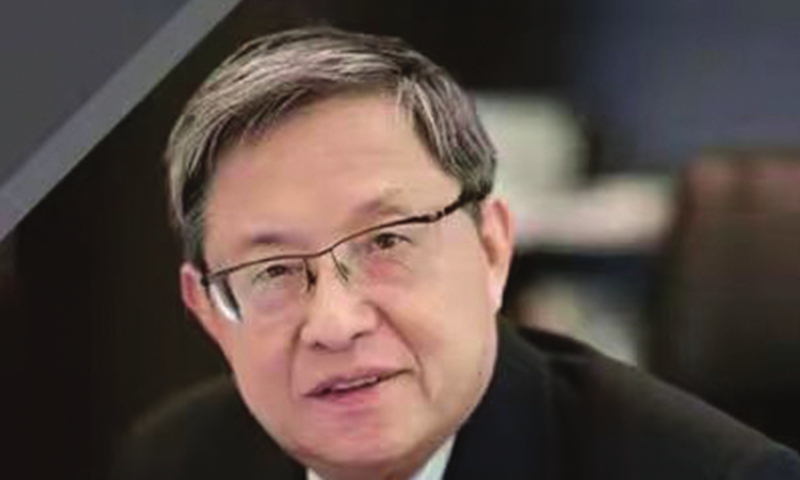
Zhou Wenzhong
GT: As the ambassador to the US from 2005 to 2010, can you talk about the issue of US arms sales to Taiwan from a historical perspective?Zhou: US arms sales to Taiwan have always been an important issue in China-US relations. In 1978, when the Carter administration decided to establish diplomatic relations with China, negotiations between the two sides on the issue of arms sales to Taiwan were once stuck in a deadlock. Comrade Deng Xiaoping, on the basis of his assessment of the situation, decided not to let the issue impede the establishment of diplomatic relations between China and the US, and resolutely decided to sign the communiqué.
Soon after, Carter signed into law the so-called Taiwan Relations Act in April 1979 out of his consideration of domestic and diplomatic situations, which allowed for the provision of "defensive" weapons to Taiwan until the Taiwan question was finally resolved. This US domestic law has been the "legal" basis for its arms sales to Taiwan, which constitutes a gross interference in China's internal affairs, and it is not recognized by the Chinese government.
When President Reagan took office in 1981, the US and China held grueling negotiations over arms sales to Taiwan, which led to the issuing of the August 17 Communiqué the following year. In the communiqué, the US pledged that "it does not seek to carry out a long-term policy of arms sales to Taiwan ...... and that it intends gradually to reduce its sale of arms to Taiwan, leading, over a period of time, to a final resolution." The communiqué was issued by the US and China to resolve the issue of US arms sales to Taiwan.
However, the US side has not kept its promise. In the 40 years since the issuing of the August 17 Communiqué, US arms sales to Taiwan have totaled more than $70 billion. The Biden administration has pledged that the US does not seek a new Cold War with China, that it does not aim to change China's system, that the revitalization of its alliances is not targeted at China, and that the US does not support "Taiwan independence;" and it has no intention to seek a conflict with China. But it has acted in the opposite direction, selling arms to Taiwan five times as of July 2022, totaling nearly $1.2 billion. On September 2, the Defense Security Cooperation Agency announced three batches of arms sales to Taiwan, worth a total of $1.1 billion.
From this historical perspective, when the US has sold so many weapons to Taiwan, we cannot help but ask, does it sincerely want peace and stability in the Taiwan Straits? Does it sincerely want a peaceful solution to the Taiwan question? I believe that the US side is the real disrupter of the status quo of peace and stability in the Taiwan Straits.
GT: What do you think is the real intention behind the US arms sales to Taiwan?
Zhou: To begin with, I think the US is still acting on its strategy of "exploiting Taiwan to contain China," which is the root cause of tension in the Taiwan Straits, and the sale of arms to Taiwan is an important means. The US side wrongly believes that maintaining the separation across the Taiwan Straits is in its long-term strategic interests, so it keeps playing the "Taiwan card" and helping Taiwan to counterbalance the mainland by force, with the intention of obstructing China's reunification and stalling the process of the great rejuvenation of the Chinese nation.
Secondly, the US attempts to maintain a military presence in Taiwan. Before the establishment of diplomatic relations between China and the US, Taiwan was actually a US military base in the Western Pacific. After China and the US established diplomatic relations, the US was unwilling to withdraw its troops from Taiwan and lose this "unsinkable aircraft carrier," so it continued to strengthen its military deployment in Taiwan in disguise by selling arms to Taiwan, assisting in the training of the Taiwan military, and sharing intelligence, thereby turning Taiwan into a frontline to contain the mainland.
Thirdly, some politicians have played the "China card." For example, after the financial crisis in 2008, President Obama brought up the "China issue" when the US did not progress smoothly on the domestic agenda such as economic recovery and health care reform, and was hampered by external issues such as the Iranian nuclear issue, the DPRK nuclear issue and the war in Afghanistan, and there was also the need of midterm elections.
And finally, some forces within the US have been pushing behind the scenes. The US military-industrial complex, an interest group inextricably linked to the US government, has spared no effort to promote arms sales to Taiwan, and these arms dealers have reaped huge economic benefits. The US Congress is also a negative factor. There are quite a few US lawmakers with strong ideological overtones and anti-China and pro-Taiwan stances, and they have introduced many Taiwan-related bills, which have played some negative roles.
GT: How has China fought resolutely with the US on the issue of arms sales to Taiwan? Can you share with us your experience when you were the ambassador to the US?
Zhou: Every time the US side announces an arms sale to Taiwan, China will make representations and take a series of countermeasures in the first instance. When I was ambassador to the US, China had many exchanges with the US side on the issue of US arms sales to Taiwan.
There were two major ones. One was in October 2008, when the Bush administration announced $6.463 billion worth of arms sales to Taiwan, China immediately canceled the exchange of high-level visits between the two militaries and the exchange visits of naval ships, indefinitely postponed negotiations between the two sides on the proliferation of weapons of mass destruction, and refused to participate in a six-nation teleconference on the Iranian nuclear issue arranged by the US.
The second one was in January 2010, when the Obama administration announced arms sales to Taiwan totaling $6.392 billion. China immediately postponed the China-US consultations on strategic security, arms control and nonproliferation at the level of vice foreign ministers and imposed relevant sanctions on US military-industrial enterprises involved in the arms sales to Taiwan, the first time we publicly announced sanctions against US military-industrial enterprises.
We reached out to US government officials, members of Congress, former political leaders, and members of the business community to explain to them the dangers of arms sales to Taiwan and to make clear China's position, and I also made public speeches to the American people. We should see that there is no shortage of China-friendly people in the administration and the Congress, such as members of the House US-China Working Group, who can think rationally from the perspective of the big picture of the bilateral relationship and push it forward. Also, we hope that more people of insight will look at the China-US relationship in an objective and rational light.
After Pelosi's visit to Taiwan, it has become increasingly evident that the US side wants to obscure and hollow out the one-China principle, such as attempting to adulterate it arbitrarily with the so-called "Taiwan Relations Act" and the "Six Assurances to Taiwan," and to separate the maintenance of unofficial relations between the US and Taiwan from the one-China policy.
